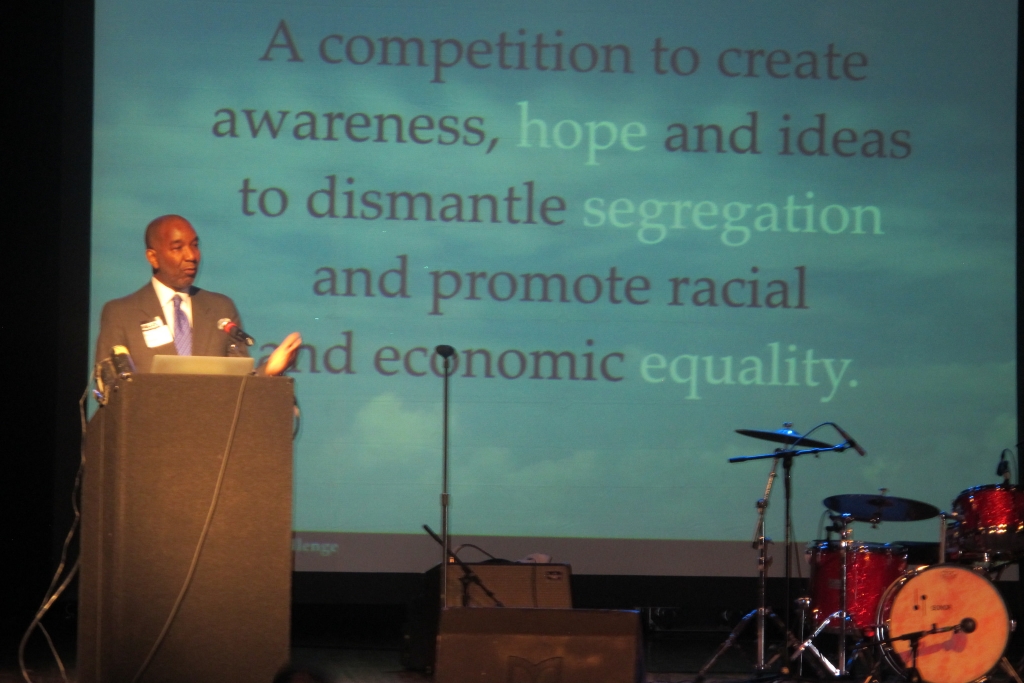Will Universal Drivers Ed Increase Racial Integration?
Plan for free driver’s education classes wins Greater Together Challenge, initiative to reduce segregation in Milwaukee.

James Hall Jr., president of the Milwaukee branch of the NAACP, addresses the audience. (Photo by Edgar Mendez)
Without a driver’s license, young African Americans have less access to upward social mobility and often remain isolated in unstable and segregated neighborhoods, according to Nichole Yunk Todd, director of policy and research at Wisconsin Community Services (WSC).
Her plan to provide free driver’s education classes to each Milwaukee Public School (MPS) student was chosen as the winner of the Greater Together Challenge, an initiative created to address segregation in Milwaukee. Yunk Todd’s plan seeks to address the problem by helping open up the city and suburbs to Milwaukee students who would be able to drive legally after taking driving classes they might otherwise not be able to afford.
The plan could also help reduce the state’s damning incarceration rate for African Americans — the highest rate in the nation — by shutting down “a pipeline for too many people into the system,” Yunk Todd said.
She added that more than half of all African Americans in Milwaukee County have their driver’s licenses suspended or revoked, which could result in incarceration.According to 2012 data from the Employment and Training Institute (ETI) at the University of Wisconsin-Milwaukee, only 17 percent of African American teens in the city had licenses, compared to 64 percent of white male teenagers living in the Milwaukee County suburbs.
In the past there were more opportunities for young people to take driver’s education courses in school, but federal funding for the programs ended in 2003, and many states, including Wisconsin, ended subsidies for the classes in 2004.
Re-implementing the programs won’t be cheap though. MPS estimates that driver’s education, if offered to each age-eligible student, would cost $1.5 million annually, which would cover either in-school lessons or a $400 voucher that could be used at a private driving school. Yunk Todd’s plan calls for $50,000 to be used to cover the cost of an initial education campaign to raise funds and gain public and private support for the program.
As the Greater Together Challenge winner, Yunk Todd won a $5,000 cash prize to develop the idea. Additional support will be provided to implement the plan.
According to Erica Conway, a member of the Greater Together board of directors, a fundraising goal of $250,000 has been set to support the initiative, including the winner’s idea.
Fifteen finalists presented their ideas at the Turner Hall Ballroom, 1040 N. 4th St. Other finalists included a two-year radio series focused on youth gun violence and a marketing plan organizers claimed would eventually reduce Milwaukee’s unemployment rate by 50 percent.
The contest, and its outcome, is an important first step towards improving a “community plagued by profound structural racism,” said Ken Hanson, CEO of Hanson Dodge Creative, who launched the Greater Together Challenge.
Hanson said circumstances that sparked the civil rights movement are still very present in Milwaukee, but the 130 submissions for the contest are evidence that many people in the city are ready to talk about segregation.
“We really can be greater together,” Hanson said.
This story was originally published by Milwaukee Neighborhood News Service, where you can find other stories reporting on fifteen city neighborhoods in Milwaukee.






















As much as I hate our country’s dependence on cars, this sounds like a very good idea.
I couldn’t be more disappointed. I can see minimal gain for maximum effort. This does nothing to get people serious about the conversation we need to have about racism in this city. Besides reinforcing the autocentric concept of how we should work, travel and socialize, it puts automobiles at the top of considerations of who we are is defined by what we drive.
We should invest this effort in improving mass transit. There are early signs of the success of the new route #6 getting people out of the city and to one of the suburban job centers.
The way to make our city and region is to invest in programs that produce better Jobs, Education and Transit People!
Obviously this is a good idea, I mean when the program was in place prior to 2003, look at how integrated the Milwaukee metro was.
There are so many better uses for our tax dollars.
The Greater Together Challenge was a slick and expensive (collateral materials including elaborate multi-page programs, pins, flyers and more) platform that may have raised a modicum of awareness in the city of the dire straits that too many of Milwaukee’s African American residents are forced to subsist in. A number of the ideas to combat racism, segregation, poor housing, education, and poverty that were offered up might in fact, over time, improve conditions and teach people to overcome their own often unconscious racist tendencies. Learning how to drive and obtaining a driver’s license was one of the projects offering the most immediate benefits, but doesn’t begin to meet the needs. And no one addressed the real problems that hold back African Americans in Milwaukee: the politicians and conservative money-holders who allocate federal block grant dollars meant to improve the inner city for its residents to white developers who hire mainly white construction workers to gentrify poor neighborhoods and jack housing prices beyond the wallets of the very people these block grants are intended to help. Multiple disparity studies at the cost of millions of dollars have proved this fact year after year, and still nothing is being done to change these Civil Rights Law violations. The NAACP won the lawsuit over the Westlawn project’s inequities, but too little too late to help residents.
I applaud people in their efforts to better Milwaukee, but really? REALLY?! This is the best we can come up with? As someone who works with children on a daily basis, I witness firsthand how many of our children are pushed into an entitlement mentality from an early age. This mentality, along with a lack of job opportunities, fatherless homes, and discrimination combine to make a force field blocking our kids from progressing. I would likely support this initiative if students who earned a C average or higher were eligible for free drivers ed…but simply providing another free service will do nothing but hold people back from learning to be responsible, hard-working, upstanding citizens.